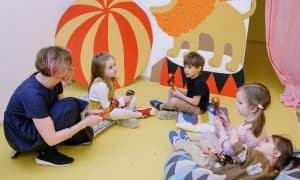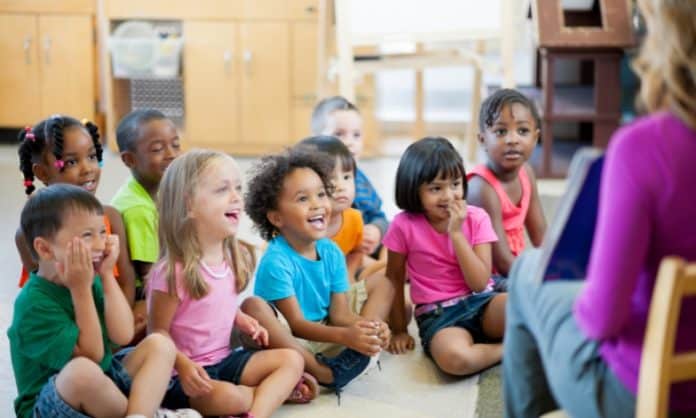The 7,000 languages spoken by humanity represent a multitude of unique worldviews. Multilingualism contributes to the development of inclusive societies with multiple cultures and knowledge systems that coexist. Every year, on 21 February, we celebrate International Mother Language Day and this year’s theme focuses on multilingual education. UNRIC spoke with Prof. Esli Struys* from the Vrije Universiteit Brussel (VUB) about different aspects of bilingual and multilingual upbringing and education.
What are the greatest benefits of bilingualism?
Prof. Esli STRUYS (E.S.): I listed six. The first is social-communicative: when you’re able to communicate with more people in their language, you have more communication opportunities. The second is emotional. People prefer to express their emotions in their native language, or the language they know best. If you can communicate with others in their language, you might get a more emotional connection with them. The third is cultural: a new world of opportunities opens in terms of culture, such as reading books or plays in original languages. The fourth is metalinguistic. Bilinguals have a better knowledge of how language works. They can compare different language systems. They know there are multiple ways to denote concepts and construct sentences. The fifth is cognitive, because each language describes the world and processes information differently. Bilinguals tend to have less extensive vocabulary in each language, but they do have a more extensive conceptual vocabulary. They have more concepts that they can describe in the languages they know. The final is neurological. Bilinguals tend to use additional or other brain areas than monolinguals. It might be that their brain is somehow more trained because they use these additional areas. This might be an advantage at a later age, which we call cognitive reserve. It is a protective buffer against some diseases that affect the development of the brain, such as Alzheimer’s disease or dementia.
When children are introduced to two languages simultaneously, how does it affect their development? Does being bilingual entail cognitive advantages?
E.S.: Children who are introduced to two languages simultaneously reach important milestones in language development at the same rate as monolingual children.

For example, combining words at around one year and a half, two years, bilingual children reach these milestones at the same age, but not always for both languages. Bilingualism does not lead to developmental delays, but it might be that development in one of the languages is a bit slower. It is perfectly possible for a child to be exposed to two languages at the same time and to develop these languages smoothly, even at a very young age. Having cognitive advantages is not just about being bilingual. It is also about the society in which you become bilingual and the opportunities to engage in bilingual conversations. Some people are proficient at switching between languages, while others are not. Some societies have a rich bilingual educational system, others do not.
Is it possible to be truly bilingual, or will one language always be dominant?
E.S.: I have done research in Brussels with bilingual children, including on one child of seven, who spoke French with her father and Dutch with her mother. I carried out a word recognition task, and could see the same response time in both languages in milliseconds. She was a perfectly balanced bilingual. This is an extreme example. Most of the time there will be a language in which these children are faster. This process is very dynamic, but it is possible to be, at one point in your life, a perfectly balanced bilingual, if there is enough exposure to both languages, such as through a bilingual school. Otherwise, the school language or the language that is dominant in society will become stronger.
How true is the statement that we have different personalities when speaking different languages?
E.S.: We must be cautious about using the word personality because, to some extent, it’s fixed. There are some differences in how we express emotions, it is called the foreign language effect. It means a bigger emotional distance in a foreign language. This can be tested by presenting people with ethical dilemmas. We noticed that people might take different decisions – more rational decisions in a foreign language than in their native language. They tend to make more emotional or non-rational decisions in a native language because emotions are connected to the mother tongue. If you are immersed in a community in your second language, you might develop an emotional attachment to that language, or, if you fall in love with someone speaking that language. So indeed, it may be that people behave in a slightly different way when they speak another language.
Many families, for example in Belgium, are raising their children not in two, but in three or even four languages. Would you have any tips for them?
E.S.: In scientific literature, there is a minimum threshold for bilingualism. You need to have at least 20% of exposure to a language to develop it well, which would mean a maximum of five languages. In Brussels, we have Dutch and French and, to some extent, English. If the language is not supported in school, it is important to use it as much as possible at home because that could be the only place where the child gets exposure. Speakers do not have to be native; they can also be very proficient second language speakers, who can expose the child to a rich vocabulary. In Brussels, there are many language communities, and some meet in cultural centres, religious places, or sports clubs. There is also often complementary schooling being offered, such as Saturday classes where literacy is developed in the heritage language. This is very good support for a child to develop literacy more systematically.

* Esli Struys is a full-time associate professor of applied linguistics at the Vrije Universiteit Brussel, Belgium. His research interests include multilingualism and cognition, multilingual development & education, second language acquisition, and interpreting studies.
More information:
Why do children learn languages more effortlessly than adults?

